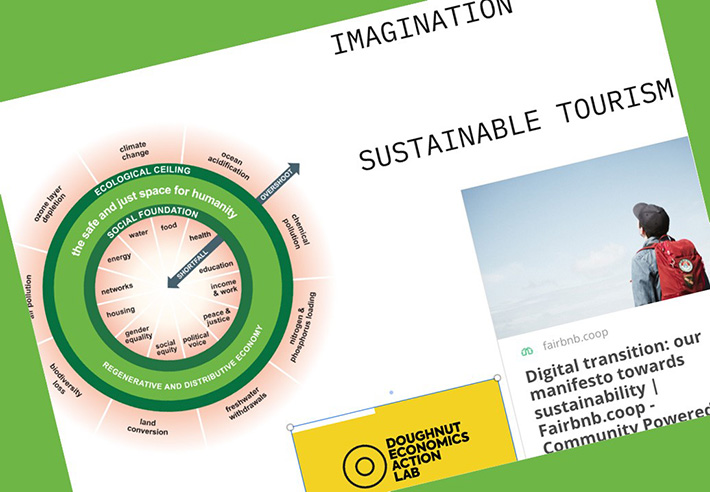2020/21
THE LOCAL ALTERNATIVE TOURISM AGENCY
Mapping the local Transnational block seminar
proposed by MKE (HUFA) Budapest.
Planned period: 8-9, 12-14 April 2021 (online)
“Tourism had long proven to be a Pyrrhic victory: the yearning for freedom from society has been harnessed by the very society it seeks to escape.*
Hans Magnus Ensenzberger

Tourism is engrained in modern life. The continuing growth in ‘global tourism’ has transformed the economic and social dynamics of cities. Comprehending or untangling the dilemmas presented by an abundance of tourists - overtourism - and its impact on local populations, the environment and all the other consequences of tourism is not simple. As leisure time activities keep increasing, so does international travel, and along with it all the various related tourist industries. Now this is all seriously restricted by COVID19.
Consequently, Life has been up-ended with changes in the modalities of transport, housing, entertainment and the basic survival needs of an increasingly large segment of the earth’s population; profound affects appear daily in all forms of both urban and rural life.
The virus has produced environmental and economic shocks; necessitated changes in how bodies move, new gestures and codes of behaviour, and revealed new images and sounds. Shifts in perceptions of public space: in parks and natural landscapes. Using diverse artistic practices the Spring 2021 Mapping the Local Transnational Block Seminar will explore and visualise these changes and new realities.
How has the ongoing fallout from the pandemic impacted when and how we travel, and our changing destinations? How do they appear in the conduct of local residents and tourists? In the actions required by social distancing? In the forms and means of communication and learning?
How can we address the situation
We are proposing that each group develop their own artistic practices that examine the current tourism puzzle. The practices are to be developed within the framework of some form of organisation: an imaginary tourist agency or non-profit company, for example. Examine and define the effects and critical issues connected to tourism its impact on the local environment, economy and the related travel practices and means of mobility.
The alternatives of new tourism initiatives should be explored: how the existing infrastructure is being/could be transformed for local residents or foreigners, real estate businesses; innovative and sustainable forms and methods reusing the tourism’ infrastructure (for instance transporting penguins from south to east pole with cheap flights), how can the global society benefit from the collapse of tourism (cheap accommodation for people), what economical solutions could be thought of, how global solidarity could be built.
Course leaders: Szabolcs KissPál, Eszter Lázár, Allan Siegel
Schedule (.pdf)
Assignments (.docx)
Projects by students: Group 1. (.pdf), Group 2. (.pdf), Group 3. (.pdf), Group 3. (.mp4) Group 4. (.pdf), Group 5. (.pdf),
Participating teachers and lecturers:
Levente Polyák (urbanist – Lisbon), Kitti Baracsi (educator, researcher, activist - Lisbon), Cindy Cordt (State Academy of Fine Arts Stuttgart), Fleeta Siegel (Kingston University London), Oliver Wetterauer (State Academy of Fine Arts Stuttgart), Volker Menk (State Academy of Fine Arts Stuttgart), Henry Grossman (CUNY - City Univ. of New York)
Participating students:
Balogh Emese (MKE), Hanna Ulmer (State Academy of Fine Arts Stuttgart), Bullás Rozália Lili (MKE), Csukás Csenge (MKE), Finta Anna Míra (MKE), Horváth Anna Róza (MKE), Juhos Antal (MKE), Marta Oliveri (MKE), Keyari Page (Kingston University London), Horváth Anna Róza, Juhos, Riccardo Capitani (Macerata Academy of Fine Arts), Alice Parola (Milan Academy of Fine Arts Brera), Nick Liebig (State Academy of Fine Arts Stuttgart), Kudela Gréta (MKE), Aoife Wims (Institute of Art and Design Dublin), Wagner Marie (State Academy of Fine Arts Stuttgart) Tar Enikő (MKE), Varga Evelin (MKE), Varga Virág (MKE), Brita Maripuu (Pallas University of Applied Sciences), Barnabás Bácsi (MKE)
